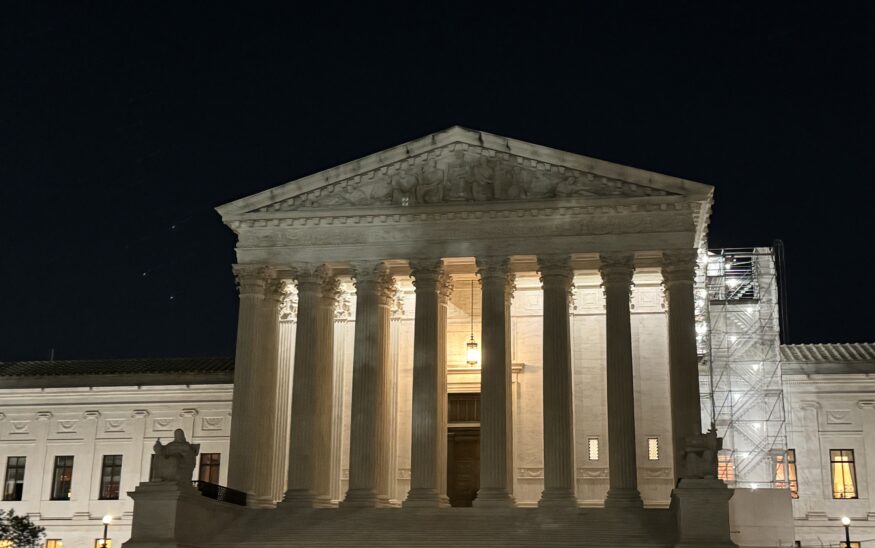Marquette Poll finds 70% oppose impeaching judges
MaryBeth Matzek, Freelance Editor//April 3, 2025//
Marquette Poll finds 70% oppose impeaching judges
MaryBeth Matzek, Freelance Editor//April 3, 2025//
IN BRIEF
- A new Marquette Law School Poll national survey finds 70% of adults saying judges should not be impeached for ruling against President Donald Trump‘s spending freezes and agency closures,
- 83%, say the president must obey a ruling by the U.S. Supreme Court.
- The public largely opposes the Dobbs v. Jackson Women’s Health decision from 2022 overturning the Roe v. Wade decision that made abortion legal in all 50 states
 A new Marquette Law School Poll national survey finds 70% of adults saying judges should not be impeached for ruling against President Donald Trump’s spending freezes and agency closures, while 30% support such impeachments.
A new Marquette Law School Poll national survey finds 70% of adults saying judges should not be impeached for ruling against President Donald Trump’s spending freezes and agency closures, while 30% support such impeachments.
Republicans are divided, with 52% opposed to impeachments of judges and 48% in favor of impeachments. Among independents, 75% oppose and 25% support impeachments, while 87% of Democrats oppose and 13% say judges should be impeached.
Those who strongly approve of Trump’s handling of his job are also most supportive of impeaching judges, with 62% supporting impeachment and 38% opposed. Support drops with those who somewhat approve of Trump’s job performance, to 36%.
The question about judge impeachment was just one of many asked about the Supreme Court and its rulings as part of the Marquette poll. The survey was conducted March 17-27, 2025, interviewing 1,021 adults nationwide, with a margin of error of +/-3.5 percentage points.
Obeying the court
A large majority of the public, 83%, say the president must obey a ruling by the U.S. Supreme Court, while 17% say the president has the power to ignore such a ruling. The percentage saying he must obey a ruling has increased slightly from 79% in December to 83% in March. Among Republicans, 78% say the president must obey the Court, as do 82% of independents and 90% of Democrats.
Of those who strongly approve of how Trump is handling his job, 76% say he must obey a Supreme Court ruling, as do 73% of those who somewhat approve, 84% of those who somewhat disapprove, and 94% of those who strongly disapprove.
The percentage saying the president must obey the Court is virtually the same for those who approve of the job the Court is doing, 83%, and for those who disapprove, 84%.
Supreme Court decisions
Approval of the Supreme Court’s job performance has increased to 54% in March, with 46% who disapprove. This is the highest approval since March 2022, when 54% also approved. This is still well below the high point of approval of the Court in Marquette Law School Poll surveys: 66% in September 2020
The public is evenly divided in thinking whether the decisions of Supreme Court justices are motivated mainly by politics or mainly by the law, with 50% saying mainly politics and 50% saying mainly the law. This is a shift from July 2024, when 57% said mainly politics and 43% mainly the law. This moderate change to seeing less political motivation, however, is small in comparison to July 2021, when just 29% said mainly politics and 71% mainly the law.
Looking back to the July 2024 decision that held that presidents have broad immunity from criminal prosecution for official acts as president, in the current poll 38% favor the decision and 62% oppose it. In this case, 65% of Republicans favor the ruling, while 71% of independents and 86% of Democrats oppose it.
The public largely opposes the Dobbs v. Jackson Women’s Health decision from 2022 overturning the Roe v. Wade decision that made abortion legal in all 50 states. A 62% majority oppose the Dobbs decision, while 38% favor it.
In 2020, the Supreme Court ruled that a federal civil rights law protects gay and transgender workers from workplace discrimination, a ruling that 82% in the current poll favor, with 18% opposed. In 11 polls since the decision, at least 80% have approved of the ruling. Support is also strong across partisan groups, with 74% of Republicans in favor, along with 82% of independents and 89% of Democrats.
In December, the Supreme Court heard arguments challenging a Tennessee law that prohibits medical providers from prescribing puberty-delaying medication or performing gender transition surgery for youth under 18. Asked how they think the Court should rule, 72% said the Court should uphold the Tennessee law, while 27% said they should overturn the law. Republicans were nearly unanimously in favor of upholding the law, 90%, with 79% of independents in favor of upholding it. Democrats were almost evenly divided, with a slight majority, 52%, in favor of the law and 48% wanting it overturned.
Related Stories
Legal News
- Court sides with DOJ, rejects man’s concealed carry license
- Madison clerk resigns amid internal investigation
- Teen charged in parents’ deaths accused of plotting to kill Trump
- WILL threatens lawsuit against USDA
- $29M verdict in negligence suit against Wis. midwife
- Auto manufacturers banned from direct sales to public
- Supreme Court: Brothers who stole from district were wrongly fired
- Class action suit against SL Greenfield can proceed
- UW Law School applications up 36%
- Milwaukee Bar holding memorial service on May 9
- Exhibit combines crops, art and the law
- DOJ reversed decision to release cop names after pushback from police groups
Case Digests
- Attorney Misconduct-Public Reprimand
- Wisconsin Fair Employment Act-Equal Protection
- Certiorari Review-Interscholastic Competition Rules
- Extension of Stop-Weight of Innocent Explanations
- Choice of Law-Freedom to Contract vs. Public Policy
- Wage Theft/Unpaid Wages-Class Certification
- Affirmative Defense-Sufficiency of Evidence
- Ineffective Assistance of Counsel-Right of Allocution
- Voluntariness Doctrine-Custodial Interrogation
- Fourth Amendment-Clear Error Standard
- Duty to Defend and Indemnify-Exclusions Clauses
- Service of Notice-Termination of Parental Rights













